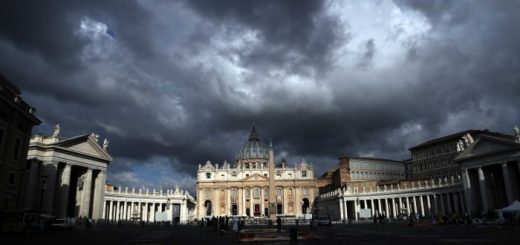Do you know the Real Jesus? Are you looking for the Real God, Pope asks

On ZENIT’s Web page, 7 September, 2016
(Note: Tormented by doubt, confusion and darkness about Jesus, John the Baptist sends messengers to ask: “Are you the one who is to come? Mother Teresa spoke of similar darkness and who among us have not gone through worse doubt and darkness? I have. Jesus is an unfathomable bundle of mysteries: God, man, judge, foot-washing friend, pardon and mercy unlimited – all conflicting concepts. Since we are free to choose what suits us best in doubt (In dubio libertas) for me Jesus is an affable, close friend to talk to, discuss and even quarrel. He is not a judge come to punish and throw the fruitless tree in hell fire. I have not seen or heard of him doing it. So like doubting Thomas, my mind insists, whether right or wrong, on seeing and touching to believe.
But John the Baptist was thinking of him rather as a harsh judge and Jesus seems to be correcting him and responding to persons also like me: “Go and tell John what you hear and see: the blind receive their sight and the lame walk, lepers are cleansed and the deaf hear. And the dead are raised up, and the poor have good news preached to them.” His judgement is drenched in mercy and pardon because, have you ever seen him judging even the worst sinner. Recall his: “I too don’t judge you, go in peace, but sin no more,” to the woman caught in adultery.
So I don’t “take offense at Him” at all or consider his actions as “an obstacle”, but rather a proof that he is “Mercy and goodness personified.” But the biggest  question clamouring for clarification for me is this: Have we now to “believe in the God of Jesus Christ,” only and not any more “in the God in Jesus Christ?” That would really be confusion confounded at least for me. james kottoor, editor)
question clamouring for clarification for me is this: Have we now to “believe in the God of Jesus Christ,” only and not any more “in the God in Jesus Christ?” That would really be confusion confounded at least for me. james kottoor, editor)
We heard a passage of Matthew’s Gospel (11:2-6). The evangelist’s intention is to make us enter the mystery of Jesus more profoundly, to receive His goodness and mercy. The episode is the following: John the Baptist sends his disciples to Jesus – John was in prison – to ask Him a very straightforward question: Are you he who is to come, or shall we look for another?” (v. 3).
It was precisely in the moment of darkness. The Baptist anxiously awaited the Messiah, and in his preaching he had described Him with strong language, as a judge that would finally establish the Kingdom of God and purify His people, rewarding the good and punishing the evil. He preached thus: “Even now the axe is laid to the root of the trees; every tree therefore that does not bear good fruit is cut down and thrown into the fire” (Matthew 3:10). Now that Jesus has begun His public mission with a different style, John suffers because he finds himself in twofold darkness: in the darkness of the prison and of a cell, and in the darkness of the heart. He does not understand Jesus’ style and wants to know if He is in fact the Messiah, or if he must wait for another.
And Jesus’ answer seems at first sight not to correspond with the Baptist’s request. In fact, Jesus says: “Go and tell John what you hear and see: the blind receive their sight and the lame walk, lepers are cleansed and the deaf hear. And the dead are raised up, and the poor have good news preached to them. And blessed is he who takes no offense at me” (vv. 4-6).
The Lord Jesus’ intent becomes clear here: He answers that He is the concrete instrument of the mercy of the Father, who goes out to all bringing consolation and salvation, and in this way manifests the judgment of God. The blind, the lame, the lepers, the deaf recover their dignity and are no longer excluded because of their illness, the dead live again while the Good News is proclaimed to the poor. And this becomes the synthesis of Jesus’ action, who in this way makes visible and tangible the action of God Himself.
The message the Church receives from this account of Christ’s life is very clear. God did not send His Son into the world to punish sinners or to annihilate evildoers. Instead, He addressed to them an invitation to conversion so that, seeing the signs of divine goodness, they could rediscover the way of return. As the Psalm says: “If thou, O Lord, shouldst mark iniquities, Lord, who could stand? But there is forgiveness with thee, that thou mayest be feared” (130:3-4).
The justice that the Baptist put at the center of his preaching, in Jesus is manifested in the first place as mercy. And the doubts of the Precursor only anticipate the disconcert that Jesus would arouse afterwards with His actions and His words. Understood, then, is the conclusion of Jesus’ answer. He says: “Blessed is he who takes no offense at me” (v. 6). “Offense” means “obstacle.” Therefore Jesus warned about a particular danger: if the obstacles to believe are above all His actions of mercy, this means that there is a false image of the Messiah. Blessed, instead, are those that, in face of Jesus’ gestures and words, give glory to the Father who is in Heaven.
Jesus’ admonition is always timely: today also man constructs images of God that impede him from enjoying His real presence. Some cut out for themselves a “do it yourself” faith that reduces God to the limited space of their desires and convictions. But this faith is not a conversion to the Lord who reveals Himself, rather it impedes Him from challenging our life and our conscience. Others reduce God to a false idol; they use His holy name to justify their own interests or even hatred and violence. Still for others God is only a psychological refuge in which to be reassured in difficult moments: it is a faith that is inward-looking, impermeable to the force of the merciful love of Jesus that drives one to our brothers.
Others, again, consider Christ only as a good master of ethical teachings, one among the many of history. Finally, there are those that suffocate the faith in a purely intimist relation with Jesus, annulling His missionary impetus capable of transforming the world and history. We, Christians, believe in the God of Jesus Christ, and our desire is that of growing in the vivid experience of the mystery of love.
Therefore, let us commit ourselves not to put an obstacle to the Father’s merciful action, but let us ask for the gift of a great faith so that we too become signs and instruments of mercy.
Posted by Kathleen Naab on 7 September, 2016
We have to be careful about what concept of God we conjure up, says Pope Francis, or else we won’t be able to find the real God when he reveals himself.
The Pope offered this reflection today during the general audience, when he gave a catechesis on Matthew 11:2-6. This passage recounts the story of John the Baptist sending his disciples to Jesus – John was in prison – to ask Him a very straightforward question: Are you he who is to come, or shall we look for another?”
The Pope explained, “It was precisely in the moment of darkness … The Baptist anxiously awaited the Messiah, and in his preaching he had described Him with strong language, as a judge that would finally establish the Kingdom of God and purify His people, rewarding the good and punishing the evil. He preached thus: “Even now the axe is laid to the root of the trees; every tree therefore that does not bear good fruit is cut down and thrown into the fire” (Matthew 3:10). Now that Jesus has begun His public mission with a different style, John suffers because he finds himself in twofold darkness: in the darkness of the prison and of a cell, and in the darkness of the heart. He does not understand Jesus’ style and wants to know if He is in fact the Messiah, or if he must wait for another.”
Jesus’ answer, though, is not as straightforward as John’s question.
Jesus “answers that He is the concrete instrument of the mercy of the Father, who goes out to all bringing consolation and salvation, and in this way manifests the judgment of God,” the Pope noted.
John’s uncertainties “only anticipate the disconcert that Jesus would arouse afterwards with His actions and His words,” the Holy Father said.
And in this context, Jesus’ conclusion becomes clear: “Blessed is he who takes no offense at me” (v. 6).
False images
The Bishop of Rome went on to say that Jesus’ admonition is “always timely.”
“Today also man constructs images of God that impede him from enjoying His real presence,” he said.
The Pope went on to list five of these false images:
— Some cut out for themselves a “do it yourself” faith that reduces God to the limited space of their desires and convictions. But this faith is not a conversion to the Lord who reveals Himself, rather it impedes Him from challenging our life and our conscience.
— Others reduce God to a false idol; they use His holy name to justify their own interests or even hatred and violence.
— Still for others God is only a psychological refuge in which to be reassured in difficult moments: it is a faith that is inward-looking, impermeable to the force of the merciful love of Jesus that drives one to our brothers.
— Others, again, consider Christ only as a good master of ethical teachings, one among the many of history.
— Finally, there are those that suffocate the faith in a purely intimist relation with Jesus, annulling His missionary impetus capable of transforming the world and history.
Pope Francis exclaimed that in contrast to all of this, “Christians believe in the God of Jesus Christ, and our desire is that of growing in the vivid experience of the mystery of love.”
“Therefore, let us commit ourselves not to put an obstacle to the Father’s merciful action,” he concluded, “but let us ask for the gift of a great faith so that we too become signs and instruments of mercy.”
















